Hwyl fawrpublished at 14:30 BST 11 June 2024
Vaughan Gething’s eighth session as first minister comes to a close.
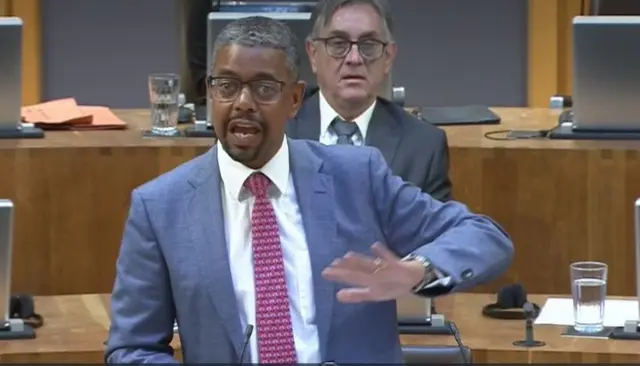 Image source, Senedd
Image source, SeneddVaughan Gething takes questions in the Senedd for the eighth time as first minister.
Alun Jones
Vaughan Gething’s eighth session as first minister comes to a close.
 Image source, Senedd
Image source, SeneddConservative Peter Fox expresses concern about NHS waiting lists for children.
He says he was "shocked to hear" that a boy classed as urgent following knee pain faced a 43-week wait for an initial appointment.
The first minister said he could not comment on individual circumstances but "comparing Aneurin Bevan health board data from April 2022 to March 2024, the number of children’s pathways on referral-to-treatment waiting lists over two years have reduced by nearly 78 per cent, despite total waits for children’s pathways rising by just over 2 per cent for the same period of time, so progress is being made".
Plaid Cymru's Delyth Jewell says there is a pattern of policies being kicked into the long grass, including reforming the school year and council tax reform.
She says, "the turmoil that has faced your government in recent weeks has made people question whether you would stick to your word, first minister. There are many, vastly important Bills, which this government has promised to deliver, from bus reform to coal-tip safety, and from tackling homelessness to the Welsh language. But people are nervous because, since you took office, your government has backtracked on reforms to council tax, 20 m.p.h. and changes to school holidays. You've signalled, time and again, that brave, progressive changes won't be made if it makes you and your government more unpopular".
The first minister replies, "the reason why we've reviewed a range of the areas of activity is partly because we've made pledges to do so; 20 mph is a good example. We'd already pledged to have a review of the implementation and to see whether we need to make any sort of changes, and we're listening to the public in doing so. I don't see that as a weakness; it's a strength. And if you look at the first set of data around the changes in the speed limits, it does show, as we said, that there are fewer casualties. It's about the refinement of that, to make sure we're getting it right in all the different areas after more than six months of experience. If you look at what we have been doing, and the legislative programme, we're actually creating more space to make sure we can deliver on the radical reforming legislation that will come forward in that legislative programme."
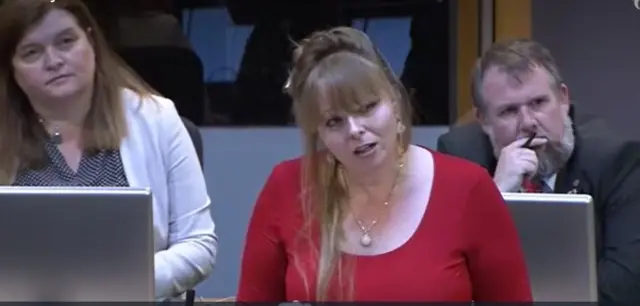 Image source, Senedd
Image source, SeneddDelyth Jewell
Plaid Cymru's Llyr Gruffydd criticises the Welsh government's record on child poverty.
The first minister replies "we are always keen to stress the importance of tackling poverty in all its guises as our priority. Unfortunately, we do not believe that the current UK government has been a positive partner in reducing child poverty".
The Welsh government has a strategy to help prevent and mitigate child poverty, external.
In Wales, around 29% of children are considered to be living in relative poverty - with a household classed as such if it is getting by on less than 60% of the UK's median income.
That works out as an income of less than £300 a week, after paying for housing costs.
Llyr Gruffydd points out that a previous target to eradicate child poverty in Wales by 2020 was dropped by the Welsh government in 2016, adding now there is "a child poverty strategy without statutory targets".
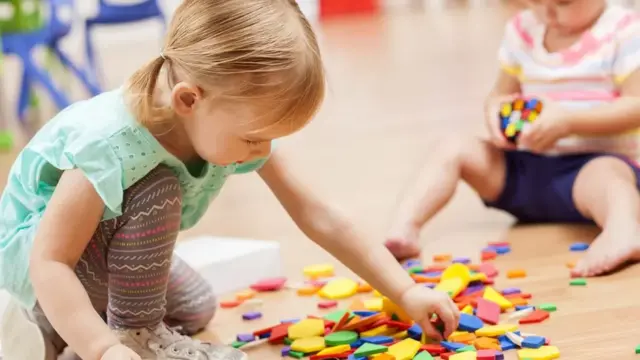 Image source, Getty Images
Image source, Getty Images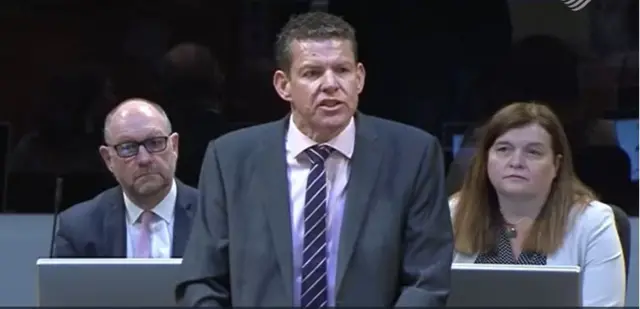 Image source, Senedd
Image source, SeneddRhun ap Iorwerth
Plaid Cymru leader Rhun ap Iorwerth invites the first minister to apologise for receiving £200,000 from a firm owned by a man previously convicted of environmental offences.
The first minister replies, "I regret the way that the last three months have been covered and reported. And I regret the impact of the choice I made within all the rules at the time."
He points out he has asked former first minister Carwyn Jones to hold a review of future Welsh Labour leadership contest rules, including looking at a cap on donations.
The Plaid Cymru leader, a former political correspondent, replies: “So it’s been the way it’s been covered, it’s the way it’s been reported? I am a former journalist, I am member of the National Union of Journalists. Are you blaming journalists for this? Are you blaming opposition members for the way that we voted in that vote last week”.
He added: “What we have here is the first minister’s judgment repeatedly called into question”.
Rhun ap Iorwerth also refers to Vaughan Gething's decision to sack his minister for social partnership, Hannah Blythyn, for allegedly leaking text messages to the media.
It followed a story, originally published by Nation.Cymru, which revealed Mr Gething told ministers he was deleting messages from a pandemic-era group chat.
The Labour MS for Delyn strongly denied that she has "ever leaked anything".
Rhun ap Iorwerth now points to the revelation by the Welsh government's director of propriety and ethics, David Richards that no leak inquiry was held.
Mr Richards told the Senedd's Public Accounts and Public Administration Committee, external that "no leak inquiry was commissioned or undertaken by the Welsh government in relation to this case. Advice was sought by the first minister and provided in relation to process on handling a breach of the Ministerial Code".
The first minister replies he "took advice from the permanent secretary", the Welsh government's top civil servant.
"I'm confident I've acted within the ministerial code and the Cabinet handbook," he tells the Senedd.
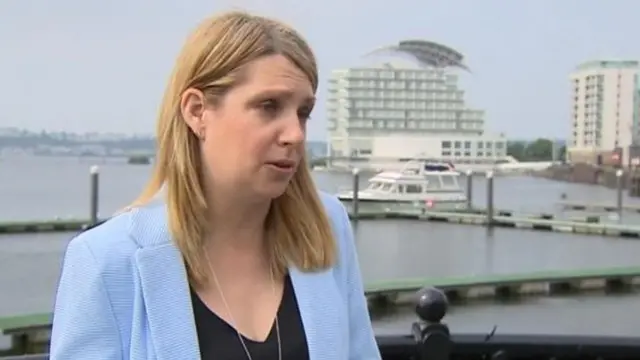
Hannah Blythyn was a junior minister in the Welsh government
Andrew RT Davies, leader of the Welsh Conservatives in the Senedd, asks whether the first minister respects the Senedd's confidence vote last week. "You lost a vote of no confidence here in the Senedd. Was it a serious debate? Or was it a 'gimmick', as you've been calling it all week?", he asks.
The first minister replies, "I take very seriously the debate that took place last week, and the vote that came from it.
"I think a lot about the institution that I have been proud to fight for, to campaign for and to vote for in not just the referenda, but in subsequent elections. I regret the fact that last week we weren't able to respect the normal traditions on pairing and the conventions that allow the democracy at the ballot box to be respected.
"But the vote took place, and the outcome is the outcome. I now need to look at the future and what that means for the few weeks I've been the first minister, and the way in which I want to lead my country into the future, and the need to build confidence across this Chamber and acceptance of the reality that I am stood here as the first minister, needing to work with different people to make the institution work. For what we have done in devolution, it has required different people to work together."
Mr Davies tells the first minister, "last week you went from this Chamber and gave an interview. You questioned myself in that interview - the time that I took off for my illness. I was told at one point in that illness to put my affairs in order, first minister. Your deputy also questioned that on The Politics Show and highlighted it. The chair of the Labour group went on Sharp End last night and cited my absence here as well from illness. I can tell you: I was ill, and I had numerous interventions from hospital doctors and other clinicians. To go out from that debate last week, and accuse me of not honouring the pairing system and then citing my own illness is the lowest of low."
Two Labour members were off sick last week so after one of the most extraordinary debates in the 25 years of Welsh devolution, 29 Senedd members voted in favour of the no-confidence resolution while 27 voted against.
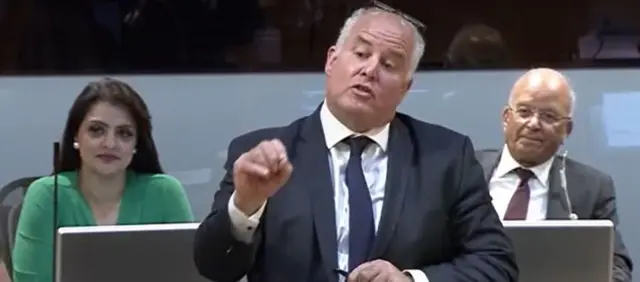 Image source, Senedd
Image source, SeneddAndrew RT Davies
Conservative Darren Millar asks "what action is the Welsh government taking to support the economy in north Wales?"
First Minister Vaughan Gething replies "our plan for boosting the north Wales economy is set out in our economic mission, external and regional economic framework. We are working with our partners to highlight its distinctive strengths and to ensure that north Wales feels the benefits of the just transition to a stronger and greener economy".
Mr Millar says that "many town centres across north Wales are struggling. Under Labour, Wales has the highest high street vacancy rate in Britain, our high streets are struggling to compete with online retailers and out-of-town shopping centres, and yet, there's a lack of access to free parking to entice shoppers onto our high streets, and we've got the least competitive business rates regime in Britain".
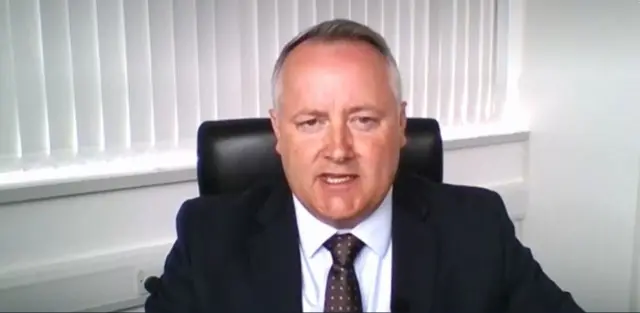 Image source, Senedd
Image source, SeneddDarren Millar
Hello and welcome to our live coverage of Vaughan Gething’s eighth session of First Minister's Questions.
It's also the first meeting since Mr Gething lost a vote of no confidence.
Mr Gething said he would not resign after 29 Senedd members voted in favour of the no-confidence motion, with 27 voting against, accusing opposition parties of "political opportunism" during a general election campaign.
The meeting is held in a hybrid format, with some members in the Siambr (Senedd chamber) and others joining by video-conference.
You can click on the play button above to watch the proceedings from 1.30pm.
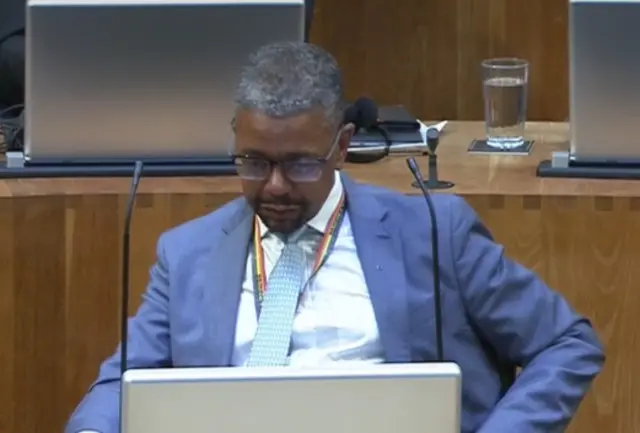 Image source, Senedd
Image source, SeneddVaughan Gething was seen in tears in the Senedd ahead of the vote last week